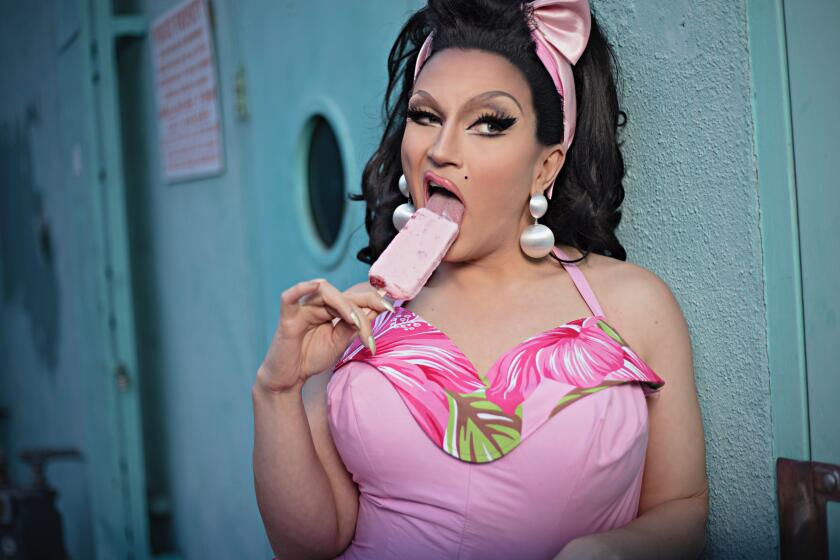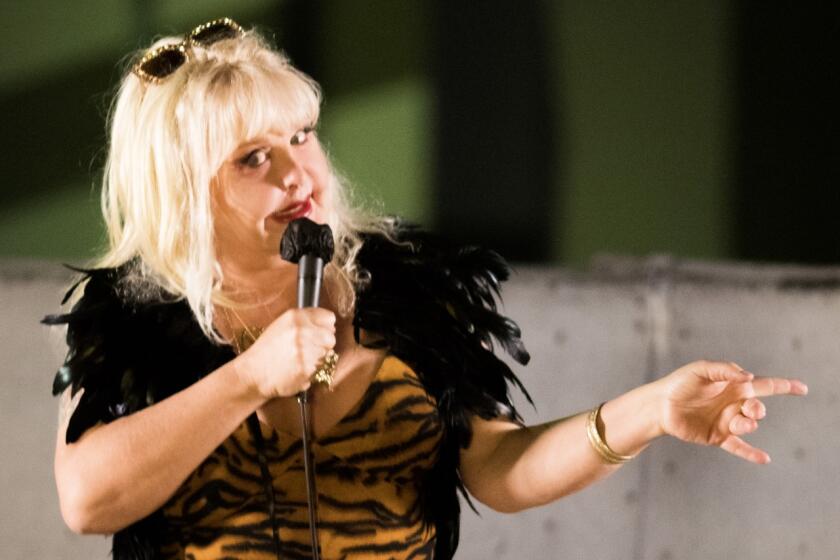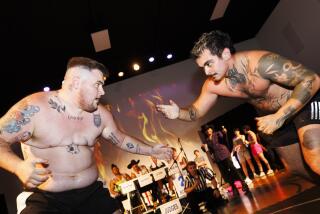Commentary: Trans comedians stand up for a community that’s often seen and not heard
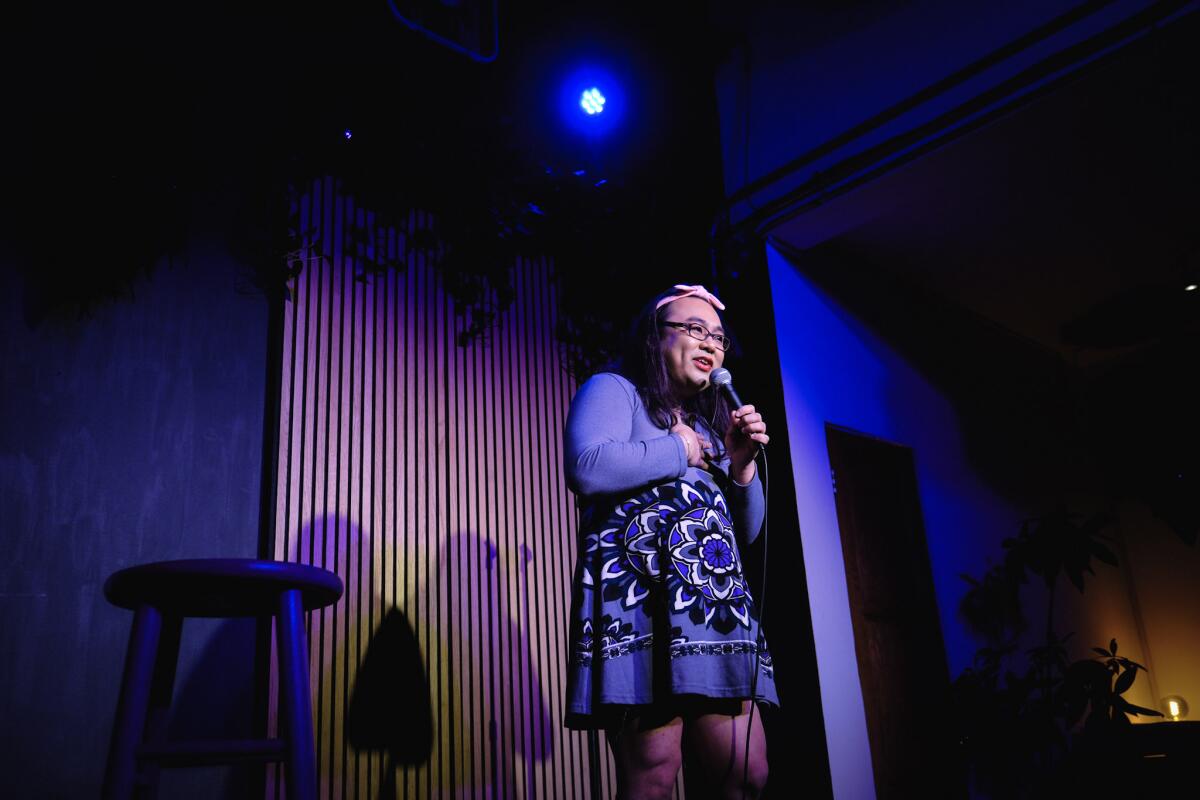
Today is the International Trans Day of Visibility. Some of you are probably thinking: “You’re joking — could these people be any more visible, considering what a tiny minority you are?” And many of you reading this might not even know a trans person — or think you don’t. Lots of trans people — especially older ones — live under the radar, in stealth mode. If we can “pass” as a cisgender man or woman, it can feel much safer to be on the down-low, not out waving the pink, white and baby blue trans flag.
Around L.A.’s stand-up scene, trans comedians who’ve pushed for equal stage opportunities alongside their cisgender peers for years have become the voice for a community that’s often seen and not heard.
Comedian Robin Tran, is one of a new generation of trans folx who are less concerned with “passing” and who are refusing to conform to what queer filmmaker Derek Jarman called “HeteroSocs’” rules and expectations.
“When I started out in comedy and going on social media. I thought my face was too ugly,” Tran told the Times. “When I started to get booked to headline I was really surprised that people were paying to see me.”
Tran’s comedy blew up on Tik Tok during COVID when her “Born Boy, Brain Girl” joke went viral overnight, racking up more than 100,000 views while she and her fiance slept; and has now been watched nearly 2 million times. Tran’s partner, Siege Gary, is also a comic and their support, love and encouragement helped Tran keep posting regularly throughout the pandemic and not get put off by social media’s tendency to overly censor trans and queer creators and covertly “shadow ban” her posts if — no when — we get reported by right-wing and/or religious trolls; a shadow ban massively restricts how many views our posts might get.
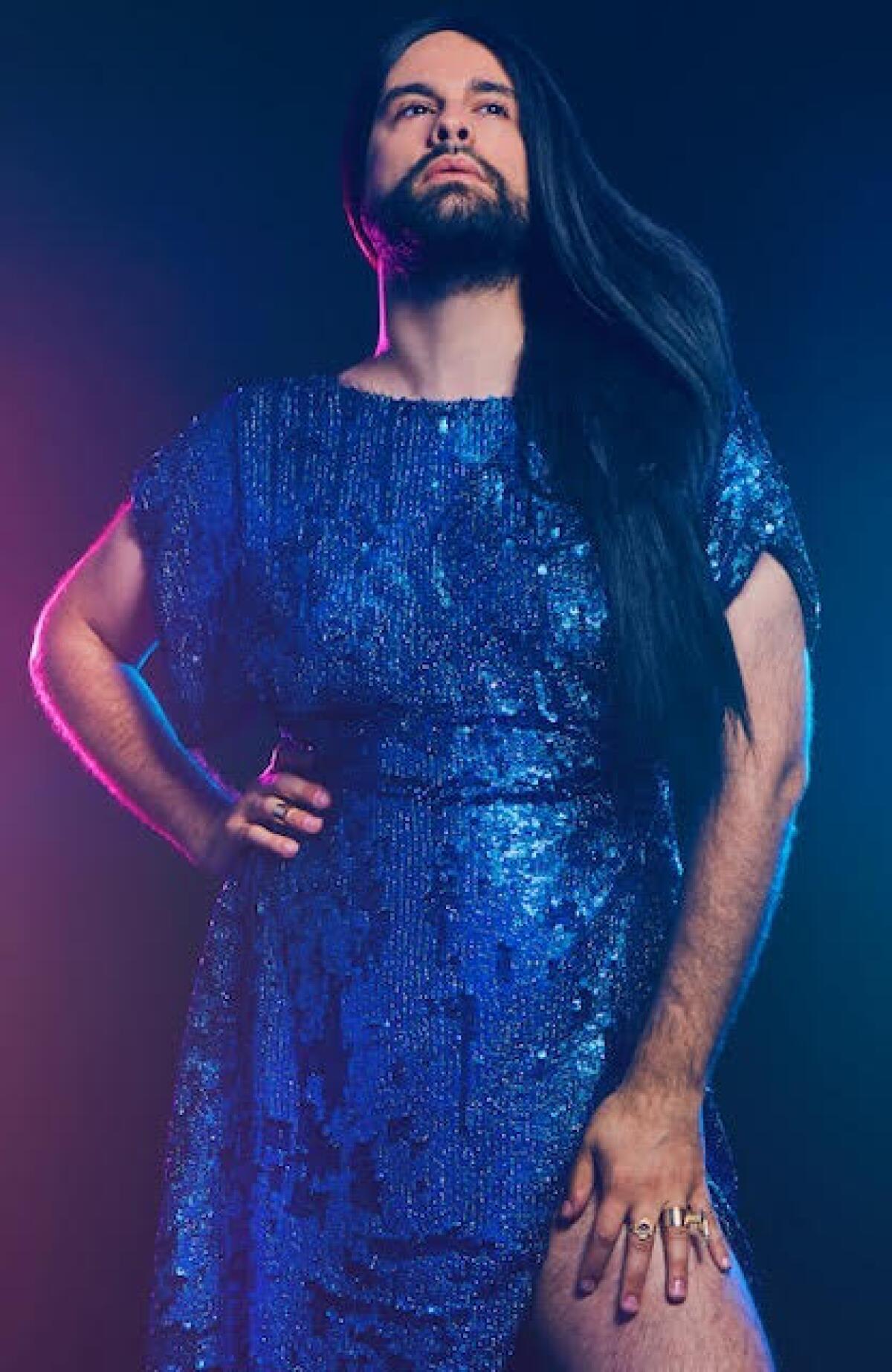
Queer Muslim comic and social media influencer Amir Yass said that TikTok not only fails to stop LGBTQIA+ from being trolled, he also gets hateful, murder-threatening trolls frequently. “Trolls started an I Hate Amir group, and I commented on their posts. TikTok quickly took down my comments and left the hate group alone,” Yass said.
Despite having to keep playing whack-a-mole with transphobic trolls and switching between social media apps to stay visible, Tran’s fame, notoriety and cool grew exponentially through lockdown. She even managed to get banned by Elon Musk on his first day in charge of #freespeech Twitter. How? She just posted a little poll. “I said, Should Elon Ban Me for Calling Him a Free Speech F-g?” The irony of the “No’s” winning and Tran still being “permanently suspended” in less than five minutes, eluded the platform’s algorithm.
So Tran emerged from the pandemic a stronger and now sought-after stand-up headliner with a lot of new Gen Z fans who just can’t get enough of her originality, authenticity and mic-drop honesty. She even caught the eye of elder statesman of comedy, David Letterman, and was chosen to be on his Netflix Is a Joke Festival “That’s My Time” special.
While trans people may appear to be “visible” in media, we are very rarely seen speaking for ourselves on TV — when we do appear in drama, we have rarely been in the writer’s rooms, had any real power, or been cast to act ourselves.
Shadi Petosky, an Emmy-winning writer and producer, has gained huge support within the trans community for speaking up against the major studios in an effort to shift the industry’s unacceptable routine appropriation of our lives and its failure to employ us to be in charge of telling our own stories. There have been many improvements in the last 10 years — thanks to Petosky and many others — but we are still mostly used in story lines to add some trauma porn and very rarely, if ever, shown experiencing the beauty of trans joy.
When we are visible in society it’s either because we are the last minority group left it’s still totally OK to be mean about and are the butt of hugely famous comedians’ jokes, or we are being killed.
Since starting work on this article I lost most of a week to the grief of Brianna Ghey, a 16-year-old trans girl TikTok creator in England, who was horrifically stabbed to death in a park by other teenagers. She was the victim of a prolonged bullying campaign and yet her school had expelled her. She was murdered just minutes after posting her last TikTok. The global trans community was distraught by this loss because we know how tough it is growing up trans and now going backwards and we fear for our friends (and ourselves).
So how many trans people are there in the United States? And is there really a trans contagion spreading among youth? That’s actually a really hard number to pin down, reliably sourced figures vary widely from .06% to 5.1% of the population.
One thing’s for sure, a lot of young people do not relate to being put in a binary gender box or having their sexuality labeled. Numbers in surveys can differ so much because of many factors, including who’s asking? Are they paying? Who has the time to answer surveys? And does so honestly! And whether we include those who identify as nonbinary: Most nonbinary people are trans because they don’t feel they are the gender they were assigned at birth and socialized into; which is based on the visible genitals of the two common sexes — male or female. And that’s how you use nonbinary pronouns! See, it’s easy!
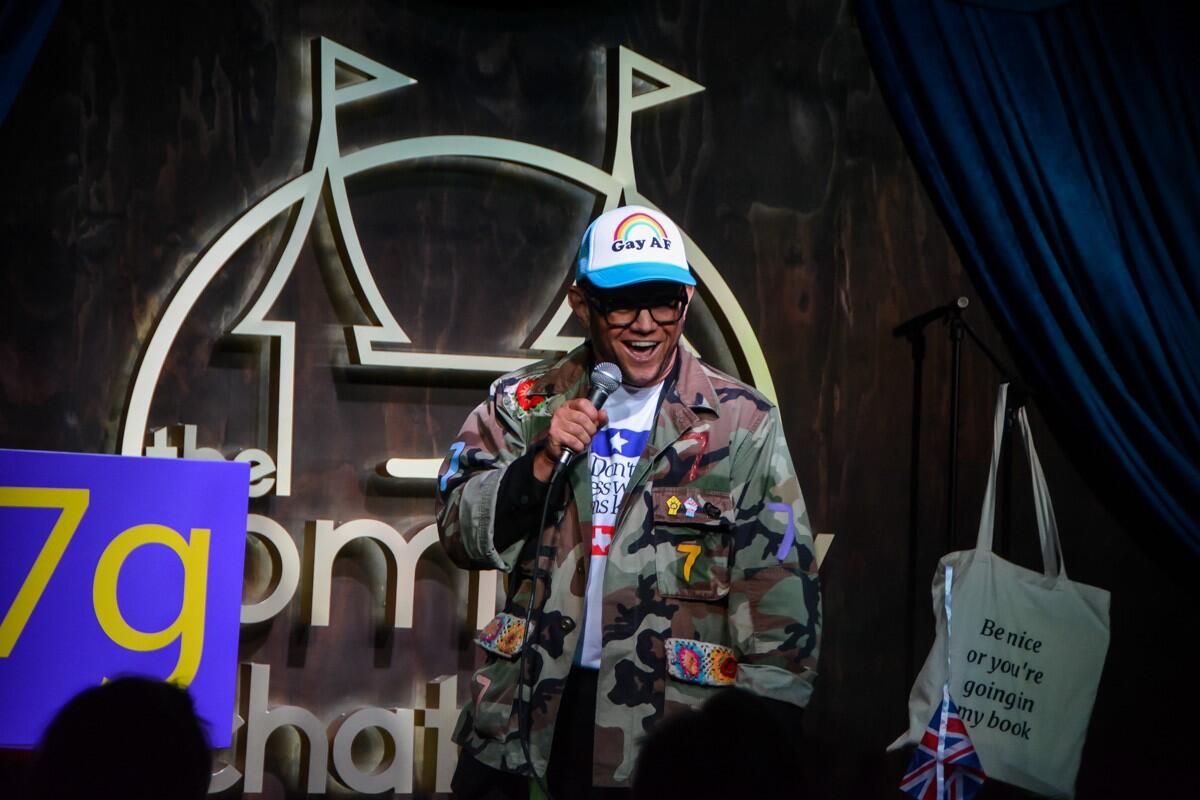
Then there are the exotic people like me who are biologically born intersex and that’s a whole other fascinating story; which, luckily for you, you can read in my first article for The Times.
Long story short, I am intersex, my body is visually nonbinary — tits and stubble — and my gender is fluid, often leaning hard into transmasculine. Some intersex people feel they are the gender they were assigned — male or female — and so don’t vibe with trans. However, those in the J.K. Rowling “Team TERF” that Dave Chappelle aligns with in his Grammy-winning Netflix special “The Closer” — often insist on cruelly misgendering many intersex (and all trans) people, denying our truth and insisting we are “really” the opposite sex. Negating the very real power of gender. A person’s sense of self.
There are currently hundreds of anti-LGBTQiA+ bills being advanced across the “United” States and at least 150 of those target trans people’s basic freedoms, including the little things like going for a pee when nature calls and having access to evidence-based, best-practice healthcare.
Fifi Dosch is the first trans comic to be passed as a paid regular at the Comedy Store. Her home state is South Dakota, which is currently attacking trans and queer rights on multiple fronts, including banning trans-affirming care for teens — which will force them to de-transition (which will lead to suicides), passing anti-drag legislation and banning LGBTQIA+ books. The way all this legislation is intersecting to restrict freedoms, it’s unlikely Dosch will be able to perform onstage in her home state again without risking arrest.
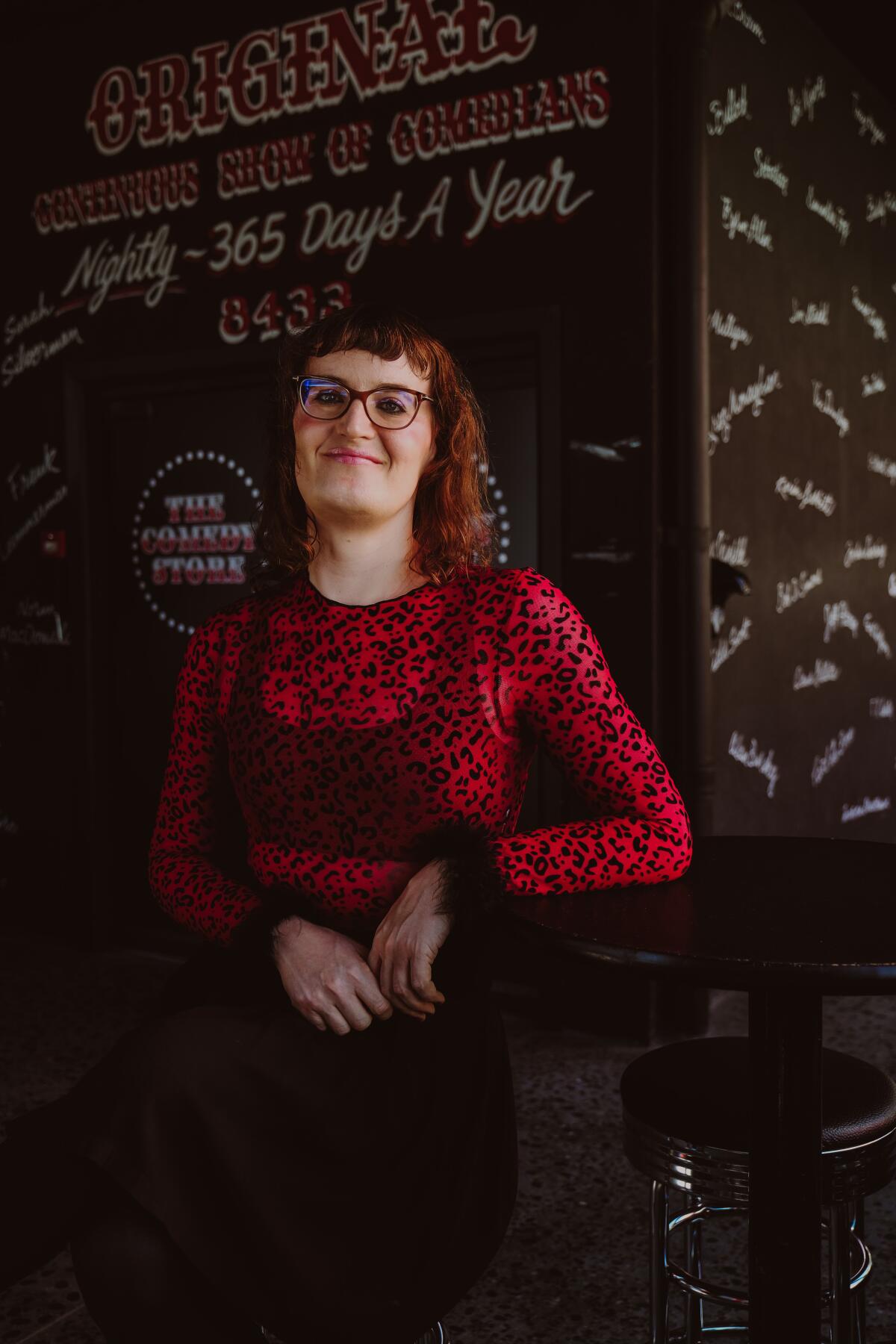
When asked what she thinks of the fears that underlie this plethora of new laws, Dosch said “If you’re afraid of me and my life, you’re a f—ing loser. Like, I’m out here playing board games, listening to lesbian bluegrass, and doing nothing threatening of any kind. If you’re afraid of me, you’re a f—ing dork.”
Always a straight talker, Dosch has blazed a path that others can follow and making the Comedy Store cool again, after some years when the club was grieving losing its matriarch, Mitzi Shore, and had a fearsome, macho, reputation for being a bit of a lion’s den — especially late at night.
Dosch owns the stage and takes her own sweet time to deliver intelligent material that is razor-sharp. The tables of lads on a big night out are no problem for her. Being a respected TV writer too, most recently on Mike Judge’s “Beavis and Butt-Head,” she knows how to pick her words carefully to kill men cleanly and without mercy.
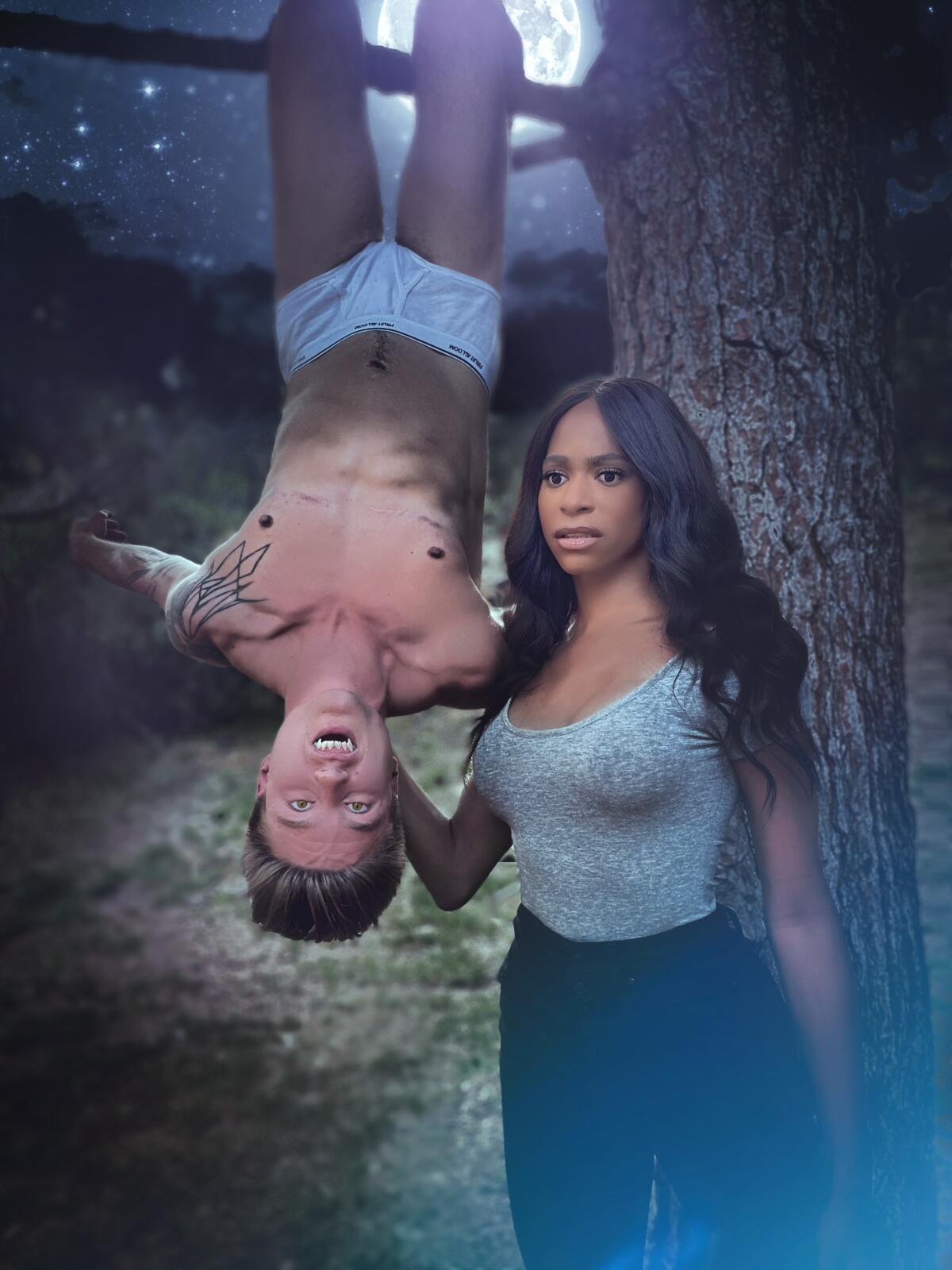
If that sounds a bit horrific and potentially threatening — good! Trans and nonbinary folx have been occupying othered roles for too long. It’s time for us to be able to go “Boo!” Marval Rex is the man to make that happen. He’s a producer and actor, who with his partner Zackary Drucker has a really great project called Spookable, combining horror, trans culture and hilarity in a very entertaining, marketable package — just looking for the right home. As Rex says, “I am painfully aware of our lack of representation, and it haunts me every day.”
While we are stereotyped by MAGA and QAnon as the scary baddies who will corrupt children, there’s an alternate reality where we can help heal the crisis of masculinity and patriarchy as it is both crumbling into irrelevance and violently reasserting itself around the world. Rex is also the mastermind behind transmasc comedy showcase — Big Dad Energy — which launched in January at the Zephyr Theater on Melrose Avenue. With the help of a city of West Hollywood grant, Rex put on a show of all transmasc comics that sold out so quickly the theater asked to do a second night a few days later — because they were turning away so many keen, disappointed, people waving wallets.
The headliner of these two shows was comedian Janaya Future Khan. A young Black nonbinary stand-up who takes their art very seriously and has studied the history and craft of stand-up with forensic precision. With a background in public speaking as an international ambassador for Black Lives Matter and heading for 500,000 followers on Instagram, Khan has a magnetic stage presence and an original voice that reminds me of a young Chappelle.
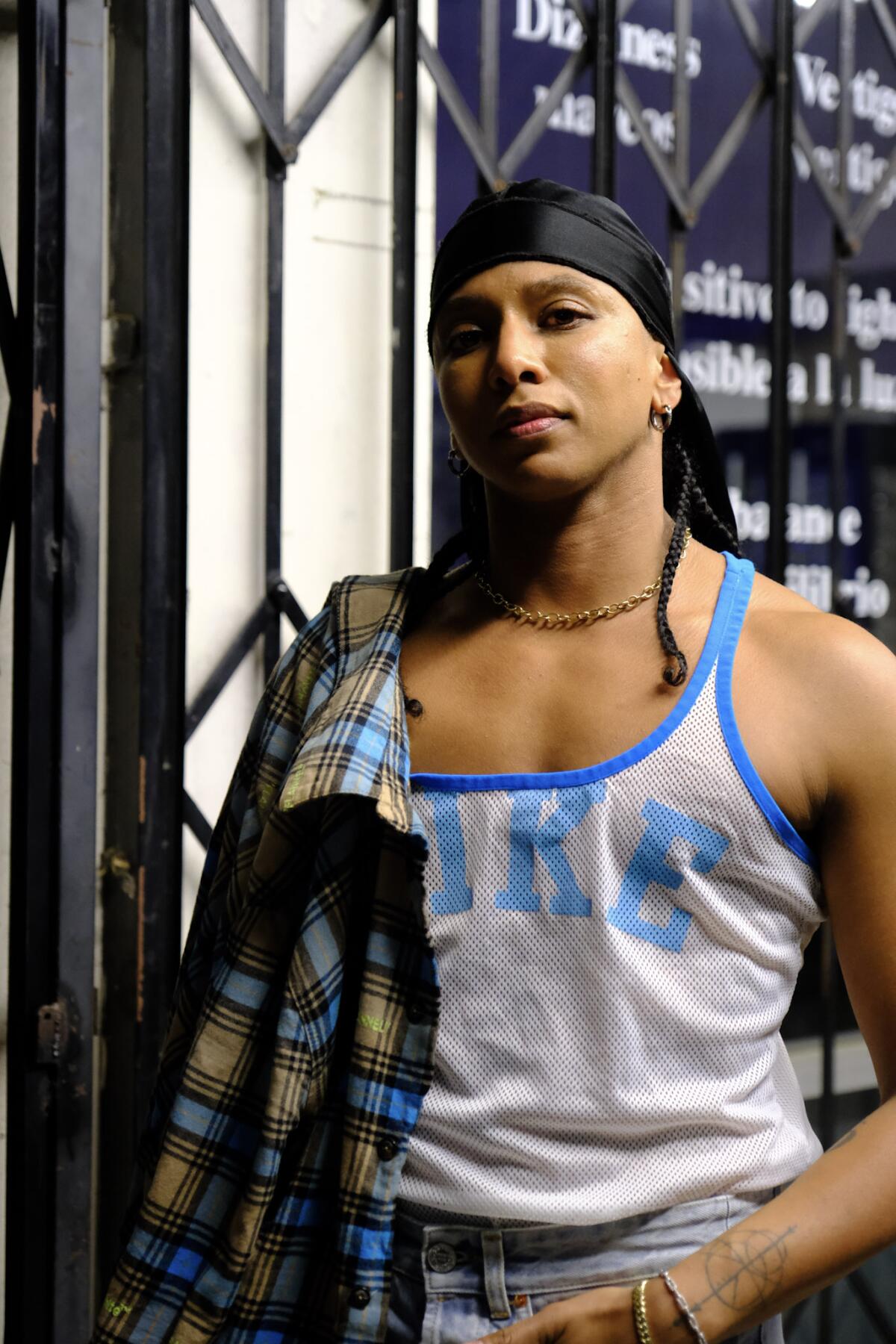
“When everyone was saying these comedians are transphobic, I thought no, the most offensive thing to me is that they came up with these jokes first,” Khan said. “Are we in the running? Are we willing to go as far as cis comedians are prepared to go to tell our truths?”
Netflix will be happy to hear that Khan doesn’t want to cancel Chappelle, or boycott the Harry Potter videogame Hogwarts’ Legacy. In fact, they go so far as to say that “the problem with Chappelle’s [trans] jokes is that he told these jokes and our community didn’t,” Khan said. They are right. Imagine how different it would sound if a trans woman was comparing her new vagina to Impossible Meat: who wouldn’t want a bespoke, made-to-measure, brand new, lower cholesterol eco-vagina? That’s ready for hard work, 365 days a year. And so is Khan, whose middle name “Future” feels oddly prophetic. They and we are the Future and it is looking bright, unique and funny AF. The question for Hollywood is: Are you ready to hear us now?
More to Read
The biggest entertainment stories
Get our big stories about Hollywood, film, television, music, arts, culture and more right in your inbox as soon as they publish.
You may occasionally receive promotional content from the Los Angeles Times.
